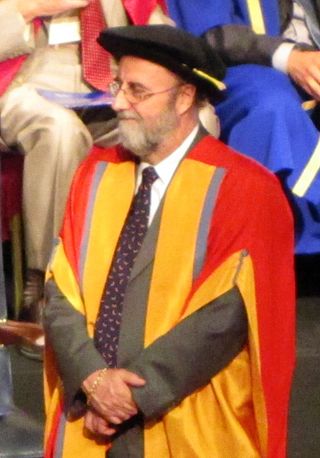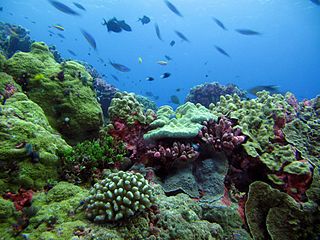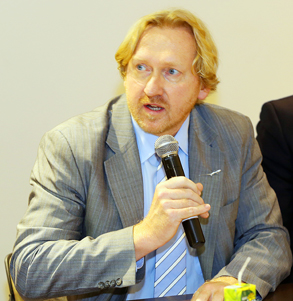
The United Nations Environment Programme (UNEP) is responsible for coordinating responses to environmental issues within the United Nations system. It was established by Maurice Strong, its first director, after the United Nations Conference on the Human Environment in Stockholm in June 1972. Its mandate is to provide leadership, deliver science and develop solutions on a wide range of issues, including climate change, the management of marine and terrestrial ecosystems, and green economic development. The organization also develops international environmental agreements; publishes and promotes environmental science and helps national governments achieve environmental targets.

Sir Robert Tony Watson CMG FRS is a British chemist who has worked on atmospheric science issues including ozone depletion, global warming and paleoclimatology since the 1980s. Most recently, he is lead author of the February 2021 U.N. report Making Peace with Nature.
The Partnership in Statistics for Development in the 21st Century, or PARIS21, was established in November 1999 by the United Nations, the European Commission, the Organisation for Economic Co-operation and Development (OECD), the International Monetary Fund, and the World Bank as a response to the UN Economic and Social Council resolution on the goals of the UN International Conference on Financing for Development. PARIS21's main objective is "to achieve national and international development goals and to reduce poverty in low and middle income countries". In pursuit of this, PARIS21 "facilitates statistical capacity development, advocates for the integration of reliable data in decision-making, and coordinates donor support to statistics". The PARIS21 Secretariat is hosted within the Statistics and Data Directorate of the OECD in Boulogne-Billancourt, France.
The UN Environment Programme World Conservation Monitoring Centre (UNEP-WCMC) is the specialist biodiversity centre of UN Environment Programme, based in Cambridge in the United Kingdom. UNEP-WCMC has been part of UN Environment Programme since 2000 and has responsibility for biodiversity assessment and support to policy development and implementation. The "World Conservation Monitoring Centre" was previously an independent organisation jointly managed by IUCN, UN Environment Programme and WWF established in 1988. Prior to that, the centre was a part of the IUCN Secretariat.

The Global Reporting Initiative is an international independent standards organization that helps businesses, governments, and other organizations understand and communicate their impacts on issues such as climate change, human rights, and corruption.

Paul Raskin is the founding president of the Tellus Institute, which has conducted over 3,500 research and policy projects throughout the world on environmental issues, resource planning, scenario analysis, and sustainable development. His research and writing has centered on propagating the Great Transition. Raskin has served as a lead author on a number of high-profile international reports, including the U.S. National Academy of Science's Board on Sustainability, the Millennium Ecosystem Assessment, the United Nations Environment Programme's Global Environment Outlook, the Earth Charter, and the Intergovernmental Panel on Climate Change (IPCC) Third Assessment Report.
Proposals for the creation of a United Nations Environmental Organization (UNEO) have come as some question the efficacy of the current United Nations Environment Programme (UNEP) at dealing with the scope of global environmental issues. Created to act as an anchor institution in the system of Global Environmental Governance (GEG), it has failed to meet those demands. The UNEP has been hindered by its title as a Programme as opposed to a specialized agency like the United Nations Educational, Scientific and Cultural Organization (UNESCO) or the World Health Organization (WHO), in addition to a lack of voluntary funding, and a location removed from the centers of political power, in Nairobi, Kenya. These factors have led to widespread calls for UNEP reform, and following the publication of Fourth Assessment Report of the IPCC in February 2007, a "Paris Call for Action" read out by French President Chirac and supported by 46 countries, called for the UNEP to be replaced by a new and more powerful United Nations Environment Organization, to be modelled on the World Health Organization. The 52 countries included the European Union nations, but notably did not include the United States and BRIC, the top five emitters of greenhouse gases.

Jacqueline Myriam McGlade is a British-born Canadian marine biologist and environmental informatics professor. Her research concerns the spatial and nonlinear dynamics of ecosystems, climate change and scenario development. She is currently professor of resilience and sustainable development at the University College London Institute for Global Prosperity and Faculty of Engineering, UK, and professor at Strathmore University in the Institute for Public Policy and Governance, Kenya.
The UNESCO World Water Assessment Programme was founded in 2000 in response to a call from the UN Commission on Sustainable Development (CSD) to produce a UN system-wide periodic global overview of the status, use and management of freshwater resources. To meet this challenge, WWAP coordinates the work of 31 UN-Water members and international partners, under the umbrella mechanism of UN-Water, in the production of the World Water Development Report (WWDR). The WWDR is the UN flagship report on water issues; it is a comprehensive review, released every year with a different focus on different strategic water issues, that gives an overall picture of the state, use and management of the world’s freshwater resources and aims to provide decision-makers with tools to formulate and implement sustainable water policies.
Environmental governance (EG) consists of a system of laws, norms, rules, policies and practices that dictate how the board members of an environment related regulatory body should manage and oversee the affairs of any environment related regulatory body which is responsible for ensuring sustainability (sustainable development) and manage all human activities—political, social and economic. Environmental governance includes government, business and civil society, and emphasizes whole system management. To capture this diverse range of elements, environmental governance often employs alternative systems of governance, for example watershed-based management. Obviously, in fact the EG arrangements are very diversed and not at all as inclusive as we could wish them to be.
The UNEP Environmental Data Explorer was an authoritative source for data sets used by the UNEP and its partners in the Global Environment Outlook (GEO) report and other integrated environment assessments. Its online database held more than 500 different variables, as national, sub regional, regional and global statistics or as geospatial data sets (maps), covering themes like Fresh water, Population, Forests, Emissions, Climate, Disasters, Health and GDP. One could display them on-the-fly as maps, graphs, data tables or download the data in different formats.

The World Database on Protected Areas (WDPA) is the largest assembly of data on the world's terrestrial and marine protected areas, containing more than 260,000 protected areas as of August 2020, with records covering 245 countries and territories throughout the world. The WDPA is a joint venture between the United Nations Environment Programme World Conservation Monitoring Centre and the International Union for Conservation of Nature World Commission on Protected Areas.

The International Resource Panel is a scientific panel of experts that aims to help nations use natural resources sustainably without compromising economic growth and human needs. It provides independent scientific assessments and expert advice on a variety of areas, including:

The United Nations Environment Programme Finance Initiative is a partnership between the United Nations Environment Program (UNEP) and the global financial sector to catalyse action across the financial system to align economies with sustainable development. As the UN partner for the finance sector, they convene financial institutions on a voluntary basis to work together with them, and each other, to find practical solutions to overcome the many sustainability challenges facing the world today. UNEP FI does this by providing practical guidance and tools which support institutions in the finance sector to find ways to reshape their businesses and commit to targets for limiting greenhouse gas emissions, protecting nature, promoting a circular economy and supporting financial inclusion to address inequality. The solutions developed effectively form a blueprint for others in the finance sector to tackle similar challenges and evolve their businesses along a sustainable pathway. The creation and adoption of such a blueprint also informs policy makers concerned with sustainability issues about what would constitute appropriate regulation for the finance sector at large. Founded in 1992, UNEP FI was the first organisation to pioneer engagement with the finance sector around sustainability. The Finance Initiative was responsible for incubating the Principles for Responsible Investment and for the development and implementation of UNEP FI’s Principles for Responsible Banking and Principles for Sustainable Insurance as well as the UN-convened net-zero alliances. Today, UNEP FI provides sustainability leadership to more than 400 financial institutions, with assets of well over $80 trillion headquartered around the world.
Ocean governance is the conduct of the policy, actions and affairs regarding the world's oceans. Within governance, it incorporates the influence of non-state actors, i.e. stakeholders, NGOs and so forth, therefore the state is not the only acting power in policy making. However, ocean governance is complex because much of the ocean is a commons that is not ‘owned’ by any single person or nation/state. There is a belief more strongly in the US than other countries that the “invisible hand” is the best method to determine ocean governance factors. These include factors such as what resources we consume, what price we should pay for them, and how we should use them. The underlying reasoning behind this is the market has to have the desire in order to promote environmental protection, however this is rarely the case. This term is referred to as a market failure. Market failures and government failures are the leading causes of ocean governance complications. As a result, humankind has tended to overexploit marine resources, by treating them as shared resources while not taking equal and collective responsibilities in caring for them.

The Minamata Convention on Mercury is an international treaty designed to protect human health and the environment from anthropogenic emissions and releases of mercury and mercury compounds. The convention was a result of three years of meeting and negotiating, after which the text of the convention was approved by delegates representing close to 140 countries on 19 January 2013 in Geneva and adopted and signed later that year on 10 October 2013 at a diplomatic conference held in Kumamoto, Japan. The convention is named after the Japanese city Minamata. This naming is of symbolic importance as the city went through a devastating incident of mercury poisoning. It is expected that over the next few decades, this international agreement will enhance the reduction of mercury pollution from the targeted activities responsible for the major release of mercury to the immediate environment.

Bradnee Chambers was an expert on international environmental governance, law and politics. In March 2013 he was appointed as the Executive Secretary of the Convention on the Conservation of Migratory Species of Wild Animals (CMS), a main United Nations multilateral conservation treaty He was also the acting Executive Secretary of the Gorilla Agreement and the Agreement on the Conservation of Small Cetaceans in the Baltic, North East Atlantic, Irish and North Seas (ASCOBANS) both administered under the UN Environment Programme. These agreements form the global framework for conservation of wild animals migrating between countries. The agreements cover an immense scope of wildlife including whales, dolphins, sharks, elephants, big cats, bats, monarch butterflies, saiga antelope, waterbirds, and migratory fish.
The Global Peatlands Initiative is an effort made by leading experts and institutions formed in 2016 by 13 founding members at the UNFCCC COP in Marrakech, Morocco. The mission of the Initiative is to protect and conserve peatlands as the world's largest terrestrial organic carbon stock and to prevent it from being emitted into the atmosphere.

Bas de Leeuw is a Dutch economist and sustainability expert. He is currently Managing Director of the World Resources Forum.
Elaine Baker holds the UNESCO Chair in Marine Science at the University of Sydney. She was the Director of the University of Sydney Marine Studies Institute from 2015 to 2020 Her position is supported by GRID-Arendal, a centre collaborating with the United Nations Environment Programme (UNEP).










